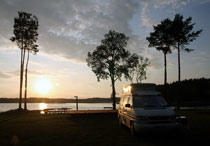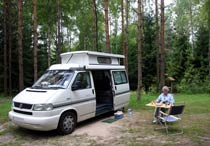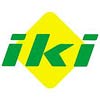 Part of the experience of finding
your way around a new country is doing your daily shopping, and the cost of
foodstuffs
is
comparatively
cheap in the Baltics reflecting lower income levels. The 3 regular supermarket
chains in Lithuania, Latvia and Estonia are Maxima, Iki and Rimi; all offer a good range of choice
with local produce, but are becoming increasingly westernised.
Part of the experience of finding
your way around a new country is doing your daily shopping, and the cost of
foodstuffs
is
comparatively
cheap in the Baltics reflecting lower income levels. The 3 regular supermarket
chains in Lithuania, Latvia and Estonia are Maxima, Iki and Rimi; all offer a good range of choice
with local produce, but are becoming increasingly westernised.
![]() Most villages have a small shop,
and some towns have a vegetable market usually still held in the town's market
square.
Most villages have a small shop,
and some towns have a vegetable market usually still held in the town's market
square.
 There was no difficulty
anywhere in the Baltics with supermarkets or garages refusing to accept payment
by credit card. Similarly you trip over ATMs every few paces in every town, city
or supermarket foyer, so obtaining cash is
problem-free.
There was no difficulty
anywhere in the Baltics with supermarkets or garages refusing to accept payment
by credit card. Similarly you trip over ATMs every few paces in every town, city
or supermarket foyer, so obtaining cash is
problem-free.

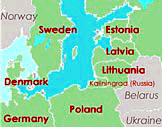


 You
should obtain a European Health Insurance Card (EHIC) before
leaving the UK, and carry your EHIC with you at all times in case of emergency. The EHIC
is not a substitute for medical and travel insurance, and only entitles you to
emergency medical treatment on the same terms as local nationals. It does not
cover you for medical repatriation, on-going medical treatment or treatment of a
non-urgent nature. It is essential therefore
also to have comprehensive travel insurance. Given the forested, low-lying topography of the
countries, midges and other flying-insects are a menace during the summer
months; you will therefore need good supplies of insect repellents. Tick-borne diseases, including
tick-borne encephalitis, are endemic in the Baltic States;
if you plan to spend
time walking in forested areas during the summer
months, it is essential to have
immunisation before you travel. For details, visit the Masta web site:
You
should obtain a European Health Insurance Card (EHIC) before
leaving the UK, and carry your EHIC with you at all times in case of emergency. The EHIC
is not a substitute for medical and travel insurance, and only entitles you to
emergency medical treatment on the same terms as local nationals. It does not
cover you for medical repatriation, on-going medical treatment or treatment of a
non-urgent nature. It is essential therefore
also to have comprehensive travel insurance. Given the forested, low-lying topography of the
countries, midges and other flying-insects are a menace during the summer
months; you will therefore need good supplies of insect repellents. Tick-borne diseases, including
tick-borne encephalitis, are endemic in the Baltic States;
if you plan to spend
time walking in forested areas during the summer
months, it is essential to have
immunisation before you travel. For details, visit the Masta web site: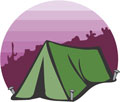



 private
or family-run, owners generally were hospitably welcoming and helpful;
at larger sites however, employed staff occasionally showed
casual or perfunctory attitudes. Some of the sites we experienced had fairly basic or old-fashioned standards of
facilities, but most generally were clean with hot water, and many had cooking
facilities (common in Eastern Europe) with wash-ups. Another Baltic
curiosity are the symbols commonly used to indicate ladies' and gents' toilets: upright triangle
(female), inverted triangle (male) - make of that what you will! - see right.
private
or family-run, owners generally were hospitably welcoming and helpful;
at larger sites however, employed staff occasionally showed
casual or perfunctory attitudes. Some of the sites we experienced had fairly basic or old-fashioned standards of
facilities, but most generally were clean with hot water, and many had cooking
facilities (common in Eastern Europe) with wash-ups. Another Baltic
curiosity are the symbols commonly used to indicate ladies' and gents' toilets: upright triangle
(female), inverted triangle (male) - make of that what you will! - see right. The Camping Card
International (CCI - Camping Carnet) is a worthwhile small
investment; it only costs £5.50, lasts for a year
and, if you are an
AA or RAC member, can be bought through Camping Organisations like the Caravan
Club. It gives a
degree of camping insurance, and since it also carries passport
details, you can offer it to campsites in place of your passport
during your stay. But on leaving, always ensure you
have been given back the right card!
The Camping Card
International (CCI - Camping Carnet) is a worthwhile small
investment; it only costs £5.50, lasts for a year
and, if you are an
AA or RAC member, can be bought through Camping Organisations like the Caravan
Club. It gives a
degree of camping insurance, and since it also carries passport
details, you can offer it to campsites in place of your passport
during your stay. But on leaving, always ensure you
have been given back the right card! Simple
answer - there is none! Camping
Gaz is unavailable in the Baltic States and we failed to find any
opportunity to exchange Camping Gaz 907 cylinders; there may be semi-legitimate sources
of re-filling empty cylinders at gas supply outlets if you are really desperate. It is essential therefore to take
sufficient for your planned period of stay in the countries.
Simple
answer - there is none! Camping
Gaz is unavailable in the Baltic States and we failed to find any
opportunity to exchange Camping Gaz 907 cylinders; there may be semi-legitimate sources
of re-filling empty cylinders at gas supply outlets if you are really desperate. It is essential therefore to take
sufficient for your planned period of stay in the countries. Coming
late to internet technology, the Baltic States have caught up fast and now put
Western Europe to shame in terms of public wi-fi internet access. In Lithuania and
Latvia, many
campsites and most cafés offer free wi-fi internet hotspots. In civilised
Estonia, people have a statutory right of internet access, and wi-fi is an
almost universal feature of life; every campsite here has a wi-fi network,
though often signal range and strength is limited.
Coming
late to internet technology, the Baltic States have caught up fast and now put
Western Europe to shame in terms of public wi-fi internet access. In Lithuania and
Latvia, many
campsites and most cafés offer free wi-fi internet hotspots. In civilised
Estonia, people have a statutory right of internet access, and wi-fi is an
almost universal feature of life; every campsite here has a wi-fi network,
though often signal range and strength is limited. 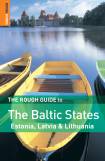


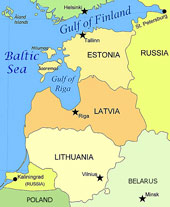


 For
planning and 'big picture' general use, the most useful overall maps of the 3
Baltic States are those published by Michelin (sheets no 782, 783, 784 - 1:350k)
- see right.
For
planning and 'big picture' general use, the most useful overall maps of the 3
Baltic States are those published by Michelin (sheets no 782, 783, 784 - 1:350k)
- see right.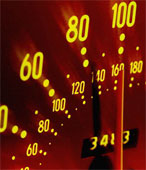
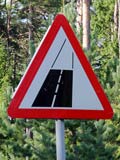 Road
standards: as with elsewhere in Eastern Europe, the 3 Baltic Republics have
benefitted from huge amounts of EU infrastructure development investment since
their accession in 2004; as
a result road conditions
and signposting are now generally good on
both main and secondary roads. Minor roads however, particularly in the
rural parts of Latvia, are less
well-surfaced and often degenerate to gravel or dirt-roads; the end of the
tarmac surface is sometimes indicated by the road-sign shown right. Locals
treat dirt-roads with indifference and their speeding raises clouds of dust and
small stones when the weather is dry, and tends to make the surface corrugated
resulting in a bumpy ride. Travelling for any distance on dry
dirt-roads also tends to fill your vehicle with fine dust. Main cross-country
trunk routes, particularly the Via Baltica, tend to be deeply rutted from the
constant pounding by heavy goods vehicles.
Road
standards: as with elsewhere in Eastern Europe, the 3 Baltic Republics have
benefitted from huge amounts of EU infrastructure development investment since
their accession in 2004; as
a result road conditions
and signposting are now generally good on
both main and secondary roads. Minor roads however, particularly in the
rural parts of Latvia, are less
well-surfaced and often degenerate to gravel or dirt-roads; the end of the
tarmac surface is sometimes indicated by the road-sign shown right. Locals
treat dirt-roads with indifference and their speeding raises clouds of dust and
small stones when the weather is dry, and tends to make the surface corrugated
resulting in a bumpy ride. Travelling for any distance on dry
dirt-roads also tends to fill your vehicle with fine dust. Main cross-country
trunk routes, particularly the Via Baltica, tend to be deeply rutted from the
constant pounding by heavy goods vehicles.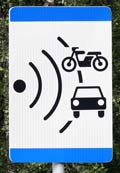 marginally cheaper than in Western
Europe with diesel priced at the equivalent of around £1.2/litre.
marginally cheaper than in Western
Europe with diesel priced at the equivalent of around £1.2/litre.